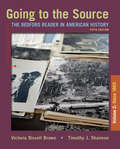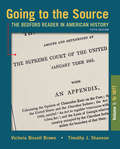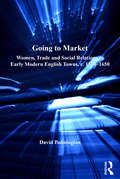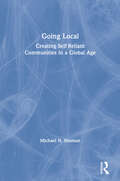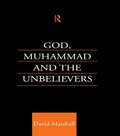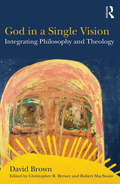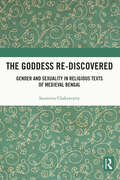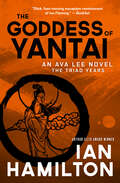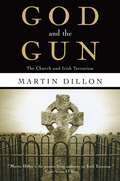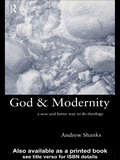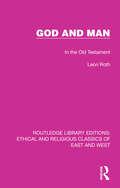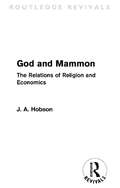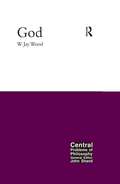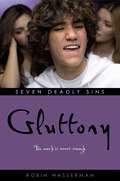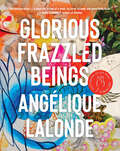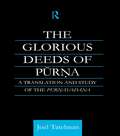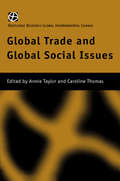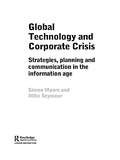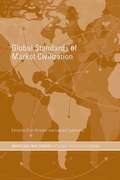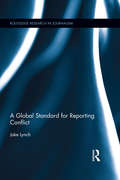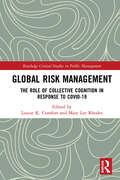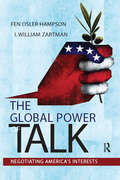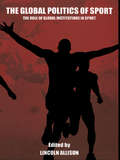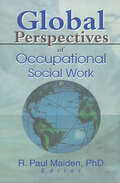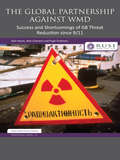Special Collections
Benetech’s Global Certified Accessible Titles
Description: Benetech’s GCA program is the first independent third-party EPUB certification to verify ebook accessibility. By creating content that is born accessible, publishers can meet the needs of all readers. Learn more: https://bornaccessible.benetech.org/
- Table View
- List View
Going to the Source, Volume II
by Victoria Brown and Timothy ShannonMany document readers offer lots of sources, but only Going to the Source combines a rich selection of primary sources with in-depth instructions for how to use each type of source. Mirroring the chronology of the U.S. history survey, each chapter familiarizes students with a single type of source while focusing on an intriguing historical episode such as the Cherokee Removal or the 1894 Pullman Strike. Students practice working with a diverse range of source types including photographs, diaries, oral histories, speeches, advertisements, political cartoons, and more. A capstone chapter in each volume prompts students to synthesize information on a single topic from a variety of source types. The wide range of topics and sources across 28 chapters provides students with all they need to become fully engaged with America’s history.
Going to the Source, Volume I
by Victoria Brown and Timothy ShannonMany document readers offer lots of sources, but only Going to the Source combines a rich selection of primary sources with in-depth instructions for how to use each type of source. Mirroring the chronology of the U.S. history survey, each chapter familiarizes students with a single type of source while focusing on an intriguing historical episode such as the Cherokee Removal or the 1894 Pullman Strike. Students practice working with a diverse range of source types including photographs, diaries, oral histories, speeches, advertisements, political cartoons, and more. A capstone chapter in each volume prompts students to synthesize information on a single topic from a variety of source types. The wide range of topics and sources across 28 chapters provides students with all they need to become fully engaged with America’s history.
Going to Market
by David PenningtonGoing to Market rethinks women’s contributions to the early modern commercial economy. A number of previous studies have focused on whether or not the early modern period closed occupational opportunities for women. By attending to women’s everyday business practices, and not merely to their position on the occupational ladder, this book shows that they could take advantage of new commercial opportunities and exercise a surprising degree of economic agency. This has implications for early modern gender relations and commercial culture alike. For the evidence analyzed here suggests that male householders and town authorities alike accepted the necessity of women’s participation in the commercial economy, and that women’s assertiveness in marketplace dealings suggests how little influence patriarchal prescriptions had over the way in which men and women did business. The book also illuminates England’s departure from what we often think of as a traditional economic culture. Because women were usually in charge of provisioning the household, scholars have seen them as the most ardent supporters of an early-modern ’moral economy’, which placed the interests of poor consumers over the efficiency of markets. But the hard-headed, hard-nosed tactics of market women that emerge in this book suggests that a profit-oriented commercial culture, far from being the preserve of wealthy merchants and landowners, permeated early modern communities. Through an investigation of a broad range of primary sources-including popular literature, criminal records, and civil litigation depositions-the study reconstructs how women did business and negotiated with male householders, authorities, customers, and competitors. This analysis of the records shows women able to leverage their commercial roles and social contacts to defend the economic interests of their households and their neighborhoods.
Going Local
by Michael ShumanNational drug chains squeeze local pharmacies out of business, while corporate downsizing ships jobs overseas. All across America, communities large and small are losing control of their economies to outside interests. Going Local shows how some cities and towns are fighting back. Refusing to be overcome by Wal-Marts and layoffs, they are taking over abandoned factories, switching to local produce and manufactured goods, and pushing banks to loan money to local citizens. Shuman details how dozens of communities are recapturing their own economies with these new strategies, investing not in outsiders but in locally owned businesses.
God, Muhammad and the Unbelievers
by David MarshallThis study of the Qur'an arises from an interest in a pressing contemporary issue, the relationship between Muslims and non-Muslims ('the Ummah and the Other'). This text explores how the Qur'an comments on this relationship as it changed in the course of Muhammad's ministry. Particular attention is paid to the portrayal in the Meccan 'punishment-narratives' of a fascinating and complex triangular relationship between God, the powerless and persecuted believing community with Muhammad at its centre, and the unbelieving Meccans who rejected Muhammad's preaching. The text raising questions about the possible contemporary relevance of this analysis, focusing firstly on discussions about the appropriate models for Islamic society today, and secondly on dialogue between Christians and Muslims. This book presents a detailed and illuminating analysis of many important Qur'anic themes and passages, and offers a coherent and original account of significant developments within the thought of the Qur'an as a whole.
God in a Single Vision
by David BrownIn the ancient conversation between Western philosophy and Christian theology, powerful contemporary voices are arguing for monologue rather than dialogue. Instead of these two disciplines learning from and mutually informing each other, both philosophers and theologians are increasingly disconnected from, and thus unable to hear, what the other is saying, especially in Anglo-American scholarship. Some Christian philosophers are now found claiming methodological authority over doctrine, while some Christian theologians even deny that philosophy has its own integrity as a separate discipline. Against these trends, David Brown has argued over the past thirty years that philosophy and theology are both necessary in order to grapple with the reality of divine mystery and Christian faith. Neither discipline can be reduced to the other, and each has its own contribution to make for a full understanding of what Brown describes as 'a single vision' of God. In this volume, Brown addresses some key topics in philosophical theology, including the created order, experience and revelation, incarnation and redemption, and heaven and our communal destiny. Combining analytic clarity, doctrinal substance, and historical depth, this volume exemplifies Brown's project of truly integrating philosophy and theology. It thus provides an ideal introduction to this vital conversation for undergraduate and postgraduate students, as well as a connected argument of interest to specialists in both disciplines.
The Goddess Re-discovered
by Saumitra ChakravartyThe book critically analyses questions of gender and sexuality in the medieval religious texts of Bengal. It analyses the emergence of religious cults in patriarchal contexts, the humanisation of the goddess figure as a wife and mother who is subject to social and ethical codes, and demythologisation of folk epics. This volume discusses the folk genre of the Mangal Kavyas such as the Chandi Mangal and the Manasa Mangal, against the perspectives of Sanskrit texts like the Devi Mahatmya and the Devi Bhagavata Purana; compares and contrasts the Kalika Purana against the texts and practices of the Tantric cult, to shed light on the paradoxes and parallels in the images of Kali found in the texts and practices dominant in the eastern region of India. The author also highlights the centrality of Chaitanya in the Gaudiya Vaishnava movement, the social and religious revolution he brought with the philosophy of raganuga bhakti along with the androgynous aspects in his relationships; explores the concept of mystical eroticism in the love of Radha and Krishna as seen in the song sequences of the Gaudiya Vaishnavas; and discusses women’s Rama-kathas found in a variety of languages across India. Rich in archival material, this book will be an essential read for scholars and researchers of gender studies, women’s studies, literature, medieval history, social history, cultural anthropology, religious studies, cultural studies, South Asia studies, and those interested in the history of medieval Bengal.
The Goddess of Yantai
by Ian HamiltonIn the latest installment of the Ava Lee novels, Ava must infiltrate the seedy world of the Chinese film industry to protect the woman she loves. Ava travels to Beijing for the premiere of Mao’s Daughter, the latest film starring her secret lover, Pang Fai. After the screening, a distraught Fai tells Ava that she is being blackmailed by senior officials of the China Movie Syndicate, who seek sexual favours in return for their continued support of Fai’s career and films. When Fai resists, the threats become increasingly menacing and include the release of scandalous videos of the young Fai that could end her career entirely.Working alongside Fai and several of her friends, Ava delves deep into the dark side of the Chinese film industry in an attempt to liberate her lover from the grasp of the Syndicate. But can Ava save Fai from her memories?
God and the Gun
by Martin DillonFirst Published in 1999. Routledge is an imprint of Taylor & Francis, an informa company.
God and Modernity
by Andrew ShanksFor the past four hundred years, theological debate has been dominated by a fundamental divide: between the liberals, with strong loyalties to the secularity of the secular state and university on the one hand, and the neo-orthodox, insisting on the absolute priority of a proper loyalty to the church community itself, on the other. God and Modernity strikes off in a fundamentally new directionAndrew Shanks boldly calls for a new and better way to do theology.Shanks argues that God is most present in a culture where public debate over ethical issues flourishes best. Social movements such as feminist movements, peace movements, and green movements have emerged to challenge both Church and State. These new movements are no longer confined to a particular confessional religious identity and are independent of state sponsorship. These social movements already made an individual impact on theology. What would a theology look like, systematically trying to reconcile older divisions in the theological debate with a new loyalty to such movements common ethos?Anyone wishing to gain a refreshing insight into a new way of understanding theology and politics will welcome this ground-breaking book.
God and Man
by Leon RothOriginally published in 1955, and containing some 500 passages, this Biblical anthology brings together, in their original wording, the highest expressions of the Biblical view of life. The anthology is non-historical and non-doctrinal. It starts with the confrontations of man with God as seen in the ‘calls’ of the prophets, and proceeds to the ways of life demanded of man and the duties accompanying the privilege of vocation. It ends with the visions of the ideal society which in times of trial the author believes have sustained the mind. When this was first published, the anthology used often forgotten texts, and in so doing stimulated much attention to these enduring religious documents.
God and Mammon
by J. A. HobsonFirst published in 1931, this is an attempt by the great economist J. A. Hobson to analyse the relations between economics and religion. After considering the origins of the conflicts and compromises between God and Mammon in the life of primitive man, the author concerns himself primarily with medieval and modern Christianity and the business climate and ethos corresponding with these periods. In particular he focuses upon Catholicism and Protestantism, before considering the attitude of the church towards modern economic movements.
God
by W.Jay WoodThis book explores two foundational questions about God: are there adequate reasons to think that God exists and if God exists, what is God like. The first and main question of the book takes up epistemological concerns, focusing on arguments for and against the claim that theism is rationally justifiable. Metaphysical questions about God's nature, in particular God's knowledge and power, comprise the second part of the volume. These two questions are related since, if the concept of a God perfect in wisdom, power and goodness is incoherent, it cannot be reasonable to believe that God exists. By exploring these foundational questions about God, readers will be able, and I hope eager, to tackle more specialized and complex questions in the philosophy of religion.
Gluttony
by Robin WassermanIt's Vegas, baby! Anything can happen. Reed has a (small) chance to win fame and fortune, thanks to his "entourage," Beth. Sick of feeling like a loser, Harper's betting she can win back her life, starting with Miranda -- whose birthday wish just might come true.... Adam's also getting lucky, with a certain ex-girlfriend. Kane, as usual, is playing hard -- and not very nice. Win or lose, it's going to be wild.
Glorious Frazzled Beings
by Angélique LalondeHome is where we love, suffer, and learn. Some homes we chose, others are inflicted upon us, and still others are bodies we are born into. In this astounding collection of stories, human and more-than-human worlds come together in places we call home. Four sisters and their mother explore their fears while teeny ghost people dress up in fragments of their children’s clothes. A somewhat-ghost tends the family garden. Deep in the mountains, a shapeshifting mother must sift through her ancestors’ gifts and the complexities of love when one boy is born with a beautiful set of fox ears and another is not. In the wake of her elderly mother’s tragic death, a daughter tries to make sense of the online dating profile she left behind. And a man named Pooka finds new ways to weave new stories into his abode, in spite of his inherited suffering. A startling and beguiling story collection, Glorious Frazzled Beings is a love song to the homes we make, keep, and break.
The Glorious Deeds of Purna
by Joel TatelmanBy providing an annotated translation of, and applying the methods of literary criticism to, a first-century account of the life of the saint Purna, this study introduces the reader to the richness and complexity of an essential Buddhist genre.
Global Trade and Global Social Issues
by Caroline Thomas and Annie TaylorIn Global Trade and Social Issues leading academics and NGO workers offer a much-needed counterweight to the liberal consensus. A critical reflection on the whole project of restructuring world trade, this is essential reading for those working in international political economy, development studies, international relations and environmental studies.
Global Technology and Corporate Crisis
by Simon Moore and Mike SeymourAccelerating global change is generating a volatile, shifting and potent array of risks and threats for business and corporate management. If business is to survive and recover, the authors argue that a major shift is needed that embraces corporate culture, operational planning and the key role of communication in the information revolution. This innovative text meets this challenge head on. It includes informed insights into the implications for strategic planning, management and communications handling for companies facing serious issues and crisis situations in tomorrow’s corporate world. With a wide-ranging review of the information and communications revolution, and a forecast of future parameters for planning and execution of crisis management, this book will be invaluable reading for all those involved in the strategic management of technology and corporate communications.
Global Standards of Market Civilization
by Brett Bowden and Leonard SeabrookeGlobal Standards of Market Civilization brings together leading scholars, representing a range of political views, to investigate how global 'standards of market civilization' have emerged, their justification, and their political, economic and social impact. Key chapters show how as the modern state system has evolved such standards have also developed, incorporating the capacity for social cooperation and self-government to which states must conform in order to fully participate as legitimate members in international society. This study analyzes their justification, and their political, economic and social impact. Civilization is a term widely used within modern political discourse its meaning, yet it is poorly understood and misused. part I explores the idea of a ‘standard of civilization’, its implications for governance, and the use of such standards in political theory and economic thought, as well as its historical application part II presents original case studies that demonstrate the emergence of such standards and explore the diffusion of liberal capitalist ideas through the global political economy and the consequences for development and governance; the International Monetary Fund’s capacity to formulate a global standard of civilization in its reform programs; and problems in the development of the global trade, including the issue of intellectual property rights. This book will be of strong interest to students and scholars in wide range of fields relating to the study of globalization including: international political economy; international political theory; international relations theory; comparative political economy; international law; historical sociology; and economic history.
A Global Standard for Reporting Conflict
by Jake LynchA Global Standard for Reporting Conflict constructs an argument from first principles to identify what constitutes good journalism. It explores and synthesises key concepts from political and communication theory to delineate the role of journalism in public spheres. And it shows how these concepts relate to ideas from peace research, in the form of Peace Journalism. Thinkers whose contributions are examined along the way include Michel Foucault, Johan Galtung, John Paul Lederach, Edward Herman and Noam Chomsky, Manuel Castells and Jurgen Habermas. The book argues for a critical realist approach, considering critiques of ‘correspondence’ theories of representation to propose an innovative conceptualisation of journalistic epistemology in which ‘social truths’ can be identified as the basis for the journalistic remit of factual reporting. If the world cannot be accessed as it is, then it can be assembled as agreed – so long as consensus on important meanings is kept under constant review. These propositions are tested by extensive fieldwork in four countries: Australia, the Philippines, South Africa and Mexico.
Global Risk Management
by Louise K. Comfort and Mary Lee RhodesThe rise and spread of Covid-19 in the beginning of 2020 presents a once-in-a-century challenge and opportunity for decision makers, managers, scholars, and citizens to understand the risks, mitigate its impact and prepare for future crises. Drawing on a global network of scholars, this book presents a comparative analysis of ten nations’ response to a global pandemic, while operating nominally under the framework of the World Health Organization. The book introduces the concept of ‘collective cognition’ as an analytic lens for examining the nations’ response to Covid-19 during the first six months of the emerging pandemic (January – June 2020) and draws out insights for improving systems of global risk management. This book addresses four primary audiences: policy-makers and leaders in nations struggling to contain viruses while guiding their societies under threat; academic researchers, students, and educators engaged in preparing the next generation of professionals committed to investigating emerging risk: managers of non-profit and private organizations that operate and maintain the networks of social, technical, and economic services that are essential to functioning communities; and the informed general public interested in understanding this extraordinary sequence of events and in managing the novel risk of COVID-19 in a more informed, responsible way.
Global Power of Talk
by I. William Zartman and Fen Osler HampsonThe Global Power of Talk explores the power of negotiation and diplomacy in US foreign policy at a critical juncture in US history. Beginning with the failure of US diplomacy in relation to Saddam Hussein's regime in the 1980s, it shows how a series of diplomatic blunders has laid the foundations for the uninhibited use of 'gun power' over 'talk power' in the last two decades. It critically examines missed opportunities in America's handling of the Israeli-Palestinian conflict in both the Clinton and George W. Bush administrations. In a provocative conclusion, the authors argue that the United States can and should negotiate with the so-called 'unengageables' like Iran, North Korea, and Al-Qaeda, in order to find ways to defuse underlying tensions in the global system.
The Global Politics of Sport
by Lincoln AllisonSport presents one of the most advanced cases of 'globalisation,' arguably because there are fewer cultural and political obstacles to the development of trade and international power in sport than there are in other fields. Thus there has been a change in the nature of the politics of sport since the end of the Cold War; the subject must be rewritten to acknowledge a twenty-first century world in which international sporting organisations and transnational corporations have become far more important than states.The Global Politics of Sport presents a range of essays examining the emerging global political issues in twenty-first century sport including: · The role, and power of organisations such as FIFA and the IOC· The influence of US exceptionalism · The construction of global sports heroes· Tensions developing within traditionally 'alternative' sports in a global commercial cultureThe Global Politics of Sport presents new and fresh exploration of different conceptions of sport as a purely commercial activity and as an activity as embodying 'higher' social and ethical values.
Global Perspectives of Occupational Social Work
by Paul MaidenExplore the history and practice of social work around the world! This fascinating book presents a broad international survey of the development and current practices of occupational social work. Covering seven countries around the world, Global Perspectives of Occupational Social Work offers a unique cross-cultural perspective on issues of interest to social workers everywhere. From India to Ireland, issues of training, sexual harassment, and workplace health and safety are remarkably similar and intriguingly varied. Global Perspectives of Occupational Social Work describes the evolution of social work in factories and, later, in offices. When industrialization brought women into factories, owners hired nurses or governesses to guard, chaperone, and advise the young women in their employ. Since then occupational social work has sought to keep a balance between the interests of management and workers. In addition to discussing history and professional development, Global Perspectives of Occupational Social Work reveals the way professionals like you handle the same situations you face every day, including: the shift toward privatization corporate restructuring and downsizing developing alcohol and substance abuse interventions creating employee assistance programs racism and sexism in the workplace HIV/AIDS and other health problems workplace violenceCovering Australia, India, Germany, Ireland, South Africa, Israel, and the US, Global Perspectives of Occupational Social Work is a major contribution to the professional literature. Not only will this book increase international awareness, it may supply you with unique perspectives and fresh strategies for solving the problems your colleagues in Jerusalem and Pretoria also face.
The Global Partnership Against WMD
by Wyn Q. Bowen and Alan Heyes and Hugh ChalmersThe 9/11 terrorist attacks prompted a new urgency in efforts to deal with chemical, biological, radiological and nuclear proliferati on. The potential acquisition and use by terrorist groups of such weaponry was suddenly a much increased threat. The G8 Global Partnership against the Spread of Weapons and Materials of Mass Destruction subsequently encouraged some twenty-two countries and the European Union to pledge up to $20 billion to address this challenge. The creation of the Global Partnership was the first time so many countries agreed to collaborate on a range of non-proliferation, security and nuclear safety programmes, as well as commit such an amount of resources to them. Based on extensive primary research, this Whitehall Paper assesses the success and shortcomings to date of the Global Partnership, and suggests how the mechanism can be bolstered and taken forward.
